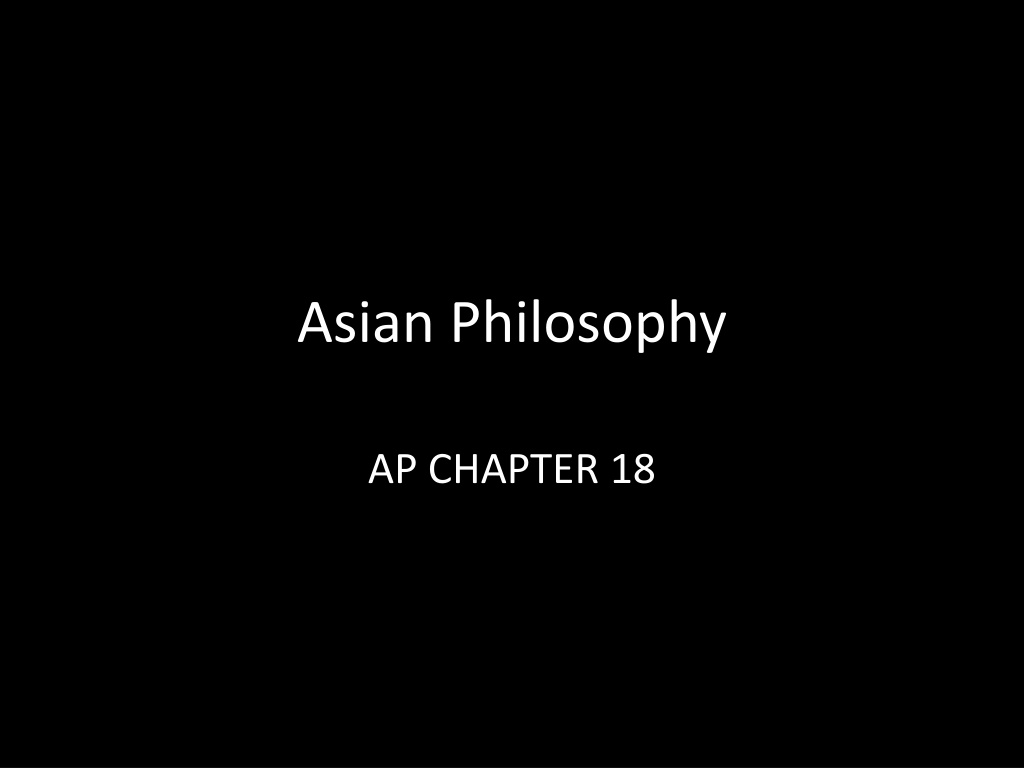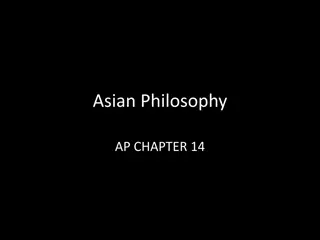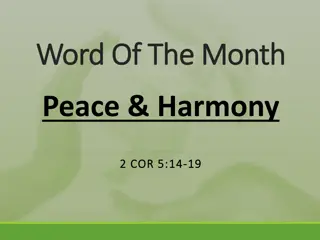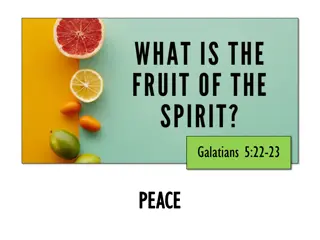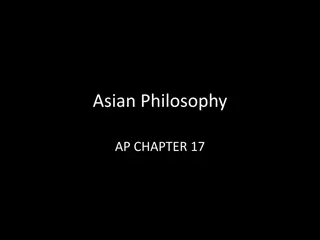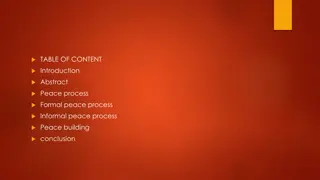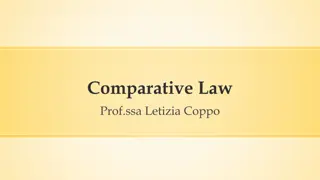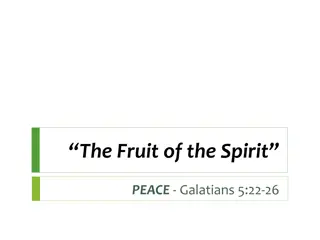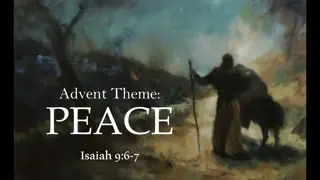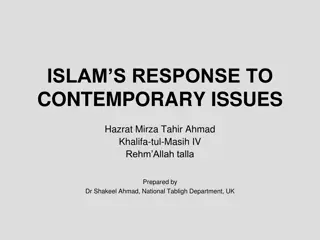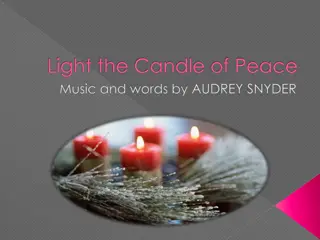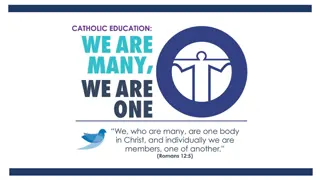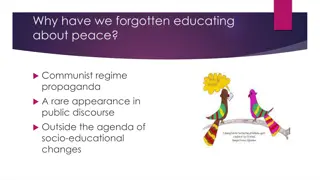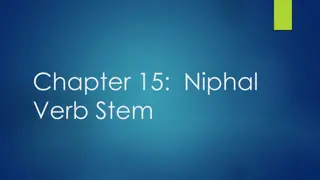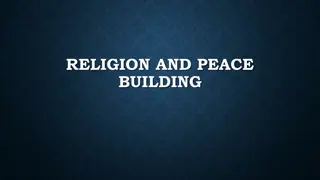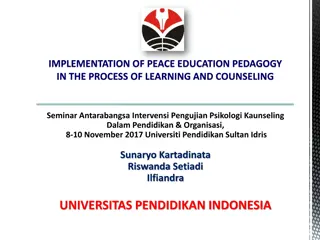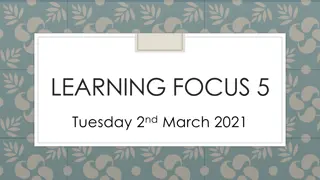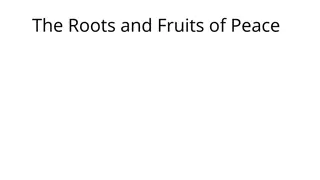Exploring Daoism: Harmony, Nature, and Peace
Daoism, a philosophical view originating during the Warring States Period, emphasizes living in harmony with nature to achieve peace and well-being. Laozi, the supposed founder, advocated simplicity, minimizing desires, and embracing the natural way of life. The core text, Daodejing, guides followers towards a life aligned with the natural order to achieve inner peace and societal harmony. Daoism views humans and nature as interconnected, urging individuals to align their actions with the primordial Dao for a fulfilling life.
Download Presentation

Please find below an Image/Link to download the presentation.
The content on the website is provided AS IS for your information and personal use only. It may not be sold, licensed, or shared on other websites without obtaining consent from the author. Download presentation by click this link. If you encounter any issues during the download, it is possible that the publisher has removed the file from their server.
E N D
Presentation Transcript
Asian Philosophy AP CHAPTER 18
Daoism Is a philosophical view that seeks a way of living well by realizing the harmony of heaven, earth, and humanity, and by realizing peace and harmony within society and within the individual person. Daoism seeks this way through what is natural and naturalness. Daoism advocates the spontaneous ease of living attained by acting in accord with the natural way of things. The core work of Daoism is the Daodejing: The Treatise on the Way and Its Power.
Laozi Laozi supposedly lived in the 6thcentury BCE. Laozi means Old Master . He inspired an intellectual movement: Learning the Mysterious Dao. Daoism has had a significant cultural impact in East Asia outside of philosophy and religion. It also plays a key role in literature, calligraphy, painting, music, and other cultural traditions.
The Context of the Development of Daoism Daoism arose during the Warring Sates Period (403-221 BCE). Laozi tells the stories of the horrors of war. Soldiers from many civilian populations suffered many deaths. There were many bloody battles. People overall wanted a return to peace. Laozi holds that poverty and starvation were caused by bad rulers, that greed and avarice caused wars and killings, and that desires for wealth, power, and glory were bringing about the destruction of society. In this context Daoism stresses that harmony and perfection found in the natural way are the road to peace.
Some Thoughts of Laozi The ideal life is the simple life of living harmoniously with nature. The ideal life is Plain Profit is ignored Cleverness Abandoned Selfishness Minimized Desires Reduced Moreover the ideal life lets nature take its course in allowing things to unfold.
Humans and Nature are United in a Larger Whole The positive view of Daoism is that humans and nature are united in a larger whole, the primordial Dao, from which everything originates, and which courses through everything. Human knowledge, at its best, transcends the limits of percepts and concepts and intuits the Dao directly. It is direct and immediate, not being dependent upon a false duality between the knowing subject and the known object. The principles that should guide life and regulate the actions of human beings are the same principles that naturally regulate all things. Life is lived well only when people are completely in tune with the whole universe and their actions are in accord with the Dao flowing through them. The institutions of society are regulated by allowing them to be what they are naturally; society, too, must be in accord with the natural way.
The Dao Dao refers to a path or a way, and in Daoism, it means the source and principle of the functioning of whatever exists. When the Dao of humanity and the Dao of the universe are one, then, according to Laozi, human beings will realize their infinite nature. Only by conforming to the Dao can one live a completely satisfying and fulfilled life. Evil comes from unregulated desire. To act without desire leads to human perfection.
The Problem of Desire-Satisfaction with Limited Resources 1. There are limited resources that all humans desire, such as food, water, land, wealth, and reproductive mates. 2. Often more than one person desires the same resource bundle, such as the same particular piece of food or land. 3. When there is desire conflict over limited resources competition is brought about between individuals that desire the same resource bundles. 4. The conflict leads to the use of power and war. 5. The use of power in war threatens the fabric of society.
Solution: Confucius vs. Laozi Confucius suggest that we introduce moral rules to regulate two things: (i) Individual actions. (ii) The fair satisfaction of everyone s desires. Laozi questions whether moral codes can solve the problem of desire conflict in the presence of limited resources. He holds that: (i) When the Dao prevailed there was no conflict. (ii) Ren and Yi were introduced when people failed to follow the Dao.
Laozi on the Failure of the Moral Approach Laozi holds that the introduction of moral codes fails to solve the problem of desire conflict in the presence of limited resources. The core problem is that moral codes merely regulate human action, they don t change our fundamental dispositions or our desires. Morality is about controlling our desires. The real problem is the desires we have. Were we not to act of desire, we would cease to have problems. To follow the Dao is to act without desire and not from desire.
Wuwei Wuwei translates as non-action. It means doing nothing except what proceeds freely and spontaneously from one s own nature. For example, Snakes should not attempt to walk or fly. Their wuwei is to crawl. A bird s wuwei is to fly. Attempting to crawl would be a forced action for a bird. For people to act to fulfill their desires is the way of greed or corruption. To live simply, without excessive desires is to act effortlessly, and in accord with their nature.
Wuwei Critical Questions What does it mean to not act from desire or to act without desire? Is it possible to act from no desire and without any desire? How do we know that the nature of snakes is to crawl and birds to fly, and for humans to walk? Hasn t it been the case that over time people tried to do things that were to the great advantage of other humans even though they were thought not to be in the nature of what humans can do? If we give up desires, would we act at all?
Ziran Ziran translates as self-so-ness. The concept is used to describe how naturalness works in Daoism. The core idea is the following: The Dao is the source of heaven and earth, and everything that proceeds from heaven and earth. As a consequence, everything has the Dao within it. Laozi s chain: People model themselves on the earth, the earth models itself on Heaven, Heaven models itself on Dao, and the Dao models itself on self-so-ness. Everything has a fundamental nature and functioning.
The Dao is Nameless The Dao is difficult to talk about because it is the ultimate source and way of things. As a consequence, we should note that talking about the Dao is not the same as the Dao. We should not confuse talk of the Dao with what the Dao itself is. The Dao is nameless. It is unified, like an uncarved block, changeless in itself, and yet the source of all change. The Dao points to that which enables things to be what they are, and which gives things their existence and their ways of functioning.
De De means function. Each individual thing possesses a function or de of Dao. Dao provides for both existence and function. And de is the function of each individual thing. An important symbol of de, as the power of something to do what it does, is the uncarved block that can become anything in the hands of an artist.
Advice to Rulers Laozi s advice to rulers: 1. Govern as little as possible. 2. Let people follow the natural way. 3. Handle the people with care. The more laws we put in place the more crime we will see. One who knows the Dao and the De will know how to stay out of the way of people and serve them without intruding.
The Dao Dao is empty (like a bowl). It may be used but its capacity is never exhausted. It is bottomless, perhaps the ancestor of all things. It blunts its sharpness. It unites its tangles. It softens its light. It becomes one with the dusty world. Deep and still it appears to exist forever.
Explanation of the Dao Empty = without characteristics. Emptiness = infinite capacity. The Dao is eternal and recurrent. That the Dao is dusty with the world means that it is not something above and beyond the world. Rather, it is something to be found in the world.
